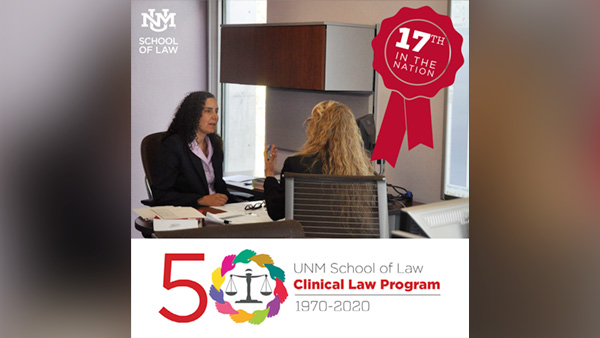UNM Law Clinic Partners with ADOBE Program to Give Previously Incarcerated Youth a Brighter Future
March 5, 2021 - Annie Swift

Juvenile detention can gravely impact a child’s life. According to national studies, approximately 70% of previously incarcerated youth experience recidivism. Many of these youths live with serious substance abuse and mental health challenges that disrupt education and home life. Dr. Andrew Hsi, a professor of Family and Community Medicine and Pediatrics at the University of New Mexico School of Medicine, founded a groundbreaking program to respond to the needs of youths who have been incarcerated at the Bernalillo County Youth Services Center (“YSC”). The ADOBE Program has been able to reduce the 70% recidivism rate to just 21%.
The ADOBE Program provides medical, mental health, navigation, and education services to previously incarcerated teenagers and their families. The medical team consists of a primary care pediatrician, a family nurse practitioner, a psychiatrist, and a psychiatric nurse practitioner who provide support within two weeks of a youth’s discharge from YSC. The youth work with an educational liaison who helps identify their strengths, areas of improvement, and future goals, while advocating for any necessary educational services. A home navigator addresses health harming social determinants such as housing and rental resources, and facilitates access to food, clothing, and utilities.
The ADOBE Program also partners with the UNM School of Law Clinical Program to provide legal services to the youth and their families. The Clinic students offer advice for various legal matters, including housing conditions and eviction, public benefits, guardianships, domestic violence, teen parent custody and child support, and emancipation. Dr. Hsi lauds the Clinic for reducing racial and ethnic disparities that often accompany access to legal resources. He notes that the ADOBE Program has worked with many families of color who never thought they would be able to afford legal representation. The UNM Law students open doors that may have otherwise remained closed.
UNM Law Professor Sarah Steadman has supervised the students in the Child Family and Justice Clinic (“CFJC”) as they work with ADOBE Program clients. Professor Steadman describes how the CFJC students become fully integrated into the ADOBE provider team through continuous collaboration. Clinic students engage with their ADOBE clients in the client’s homes and at the health care clinic to minimize barriers to transportation and ensure that the meetings occur in a trusted environment. The law students must use both their holistic problem solving and empathic skills to serve as effective social justice lawyers.
3Ls Sarah Hyde and Emily Nitschke worked as co-counsel in the CFJC providing direct services to ADOBE clients. They met with Dr. Hsi and the ADOBE team each week to ensure that the clients received holistic and interdisciplinary care. As Emily notes, “no one experiences legal issues in a vacuum.” The students needed the advice of medical and social experts to confront the various problems their clients were facing. For instance, they consulted with Dr. Hsi regarding the intersections between addiction treatment and child-custody issues. Many of their ADOBE clients dealt with other traumatic experiences, including homelessness, gang violence, and sexual abuse. The CFJC provides an invaluable opportunity to teach students trauma-informed advocacy first-hand.
The amazing partnership between the ADOBE Program and the CFJC Clinic students will continue to serve vulnerable youths as they emerge from the juvenile detention system. This essential work helps so many young people find stability and strength as they navigate serious health, housing, and legal issues.